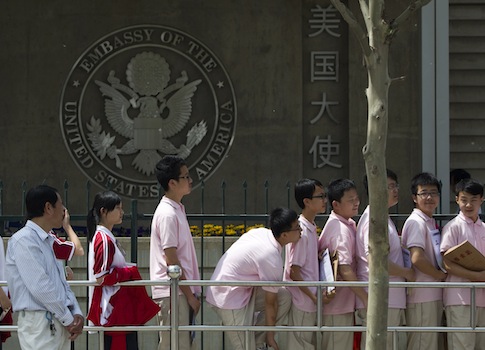The Department of Homeland Security (DHS) cannot account for nearly 50,000 foreign students taking advantage of a student work visa program, according to a new report released by the Government Accountability Office (GAO) on Friday.
The program is a threat to national security and vulnerable to potential terrorists, said Sen. Chuck Grassley (R., Iowa), who asked the GAO to review the program.
The Student and Exchange Visitor Program (SEVP), administered by Immigration and Customs Enforcement (ICE), allows individuals on student visas to remain in the country to gain work experience in their chosen fields. However, due to inadequate oversight at DHS, the government has no idea whether 48,642 foreign students are working or not.
Thirty-eight percent of the 126,796 students currently approved for "optional practical training" (OPT)—which allows them to stay in the country up to two and a half years after completion of their studies—cannot be accounted for because their records contain no employer name.
Grassley sent a letter to DHS Secretary Jeh Johnson on Wednesday asking for an immediate moratorium on the program until its problems are resolved.
"The federal government does not know where tens of thousands of foreign students in the OPT program are located, who they are working for, or what they are doing while staying in the United States," he wrote.
"The problems with OPT are extensive and serious," Grassley said. "The report not only calls into question the department’s oversight of the program, but also whether such lack of oversight is a serious national security risk."
Participation in the program has skyrocketed since 2008, from 28,497 students in 2008 to 123,328 in 2013.
Students are also rarely denied due to "ineligibility or fraud." ICE denied only 12,643 foreigners between 2008 and 2013, 2.2 percent of the 581,869 applications the agency received.
Both Grassley and the GAO referenced terrorist attacks that have been linked to the government’s visa programs.
Senior officials from the Counterterrorism and Criminal Exploitation Unit warned the program is "at risk for fraud and noncompliance, in part, because it enables eligible foreign students to work in the United States for extended periods of time without obtaining a temporary work visa."
"At least one terrorist, Faisal Shahzad, a foreign national from Pakistan, may have utilized OPT prior to planning out an attempted terrorist attack on U.S. citizens in Times Square, New York," Grassley said.
"While it is difficult to know how many other potential terrorists may have exploited OPT to remain in the United States, it is clear that the program requires an immediate overhaul before another potential terrorist exploits it," Grassley added.
The GAO cited the 1993 terrorist attack on the World Trade Center, the Sep. 11, 2001 attacks, and the Boston Marathon bombing last year, which "drew renewed attention to the need to further enhance the monitoring of foreign students."
SEVP officials within ICE claim that the program is "low-risk" because it provides an employer benefit, though they currently have no system in place to ensure that those participating are meeting the program’s requirements.
In order to receive extended legal status, a student must be working in a field related to the subject they were admitted to the country to study on their student visa. However, GAO found cases where nursing students were working in pizza parlors, in violation of ICE’s rules.
In another case, an application for a music major who was working in a restaurant was approved because he was a "member of the restaurant’s house band."
The agency also does not keep records of when students begin working.
"ICE does not require that students and school officials report this information," the report said. "Without these data, ICE cannot determine whether students with employment authorization are working in jobs related to their studies and not exceeding regulatory limits on unemployment."
Grassley said the report’s findings are "all the more disconcerting" since GAO has warned ICE about the program’s failings since 2011.
"The OPT program, which has never been approved by Congress, was created to allow foreign students to obtain temporary work in their field of study," he said. "It was created to be a benefit to employers and students alike. Yet, due to gross lack of oversight by DHS, foreign students can be undetected from enforcement."
To date, officials have "not identified or assessed risks associated with OPT," including potential fraud and noncompliance with government regulations.
According to the report, ICE is in the "early stages" of developing a "risk scorecard" to determine whether universities are abiding by the program’s rules, following up on a previous GAO recommendation issued in June 2012.
